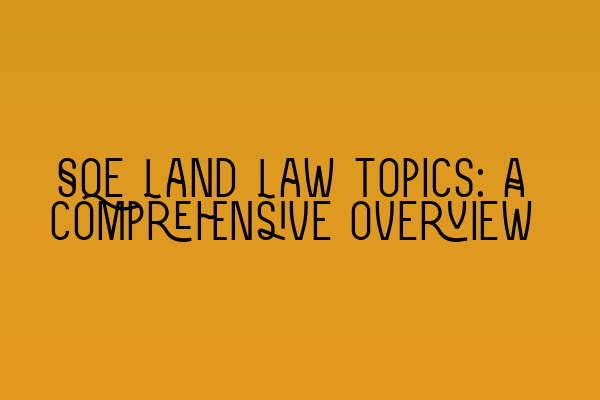**SQE Land Law Topics: A Comprehensive Overview**
Welcome to the SQE Property Law & Land Law blog! In this comprehensive overview, we aim to provide you with a detailed understanding of the key topics in Land Law that you need to know for success in the Solicitors Qualifying Examination (SQE). Whether you are a law student, aspiring solicitor, or simply looking to enhance your knowledge in this area, this article will serve as a valuable resource to boost your understanding of Land Law.
*Before we dive into the intricacies of Land Law, let’s start with a brief introduction.*
**What is Land Law?**
Land Law is a fundamental area of law that governs the rights, interests, and obligations associated with land and property. It is crucial in ensuring the proper management, ownership, and use of land, as well as resolving disputes related to land and property.
Now, let’s explore the key Land Law topics that you should focus on for the SQE examination:
**1. The Concept of Land and Property**
Understanding the legal definition of land and property is paramount. Land encompasses not only the physical surface but also what lies beneath and above the surface. Property refers to the legal rights and interests an individual can have in relation to land.
**2. Legal and Equitable Interests in Land**
Distinguish between legal and equitable interests, as they play a vital role in determining the rights individuals have in relation to land. Legal interests are recognized by law, while equitable interests arise from principles of equity and fairness.
**3. Estates and Interests in Land**
Gain an in-depth understanding of the various estates and interests that can exist in land, such as freehold estates, leasehold estates, and concurrent interests. Explore how these estates and interests impact ownership rights and obligations.
**4. Registered and Unregistered Land**
Discover the differences between registered and unregistered land, along with the implications of each. Registered land is governed by the Land Registration Act 2002, which provides a streamlined process for dealing with land transactions, while unregistered land follows the traditional conveyancing process.
**5. Co-ownership and Trusts of Land**
Learn about the principles of co-ownership and trusts of land, exploring the different forms of co-ownership (e.g., joint tenancy and tenancy in common) and the rights and duties of co-owners. Understand how trusts are used to manage co-owned property and the impact they have on the rights of beneficiaries.
**6. Leases and Tenancies**
Delve into the intricacies of leases and tenancies, covering essential topics such as duration, termination, renewal, and the rights and obligations of landlords and tenants. Familiarize yourself with the important provisions of the Landlord and Tenant Act 1954, which are highly relevant in practice.
**7. Easements and Covenants**
Explore the concepts of easements and covenants, which govern rights and obligations associated with the use and enjoyment of land. Understand the different types of easements (e.g., right of way, right to light) and covenants (e.g., positive covenants, restrictive covenants), as well as the ways in which they can be created and enforced.
**8. Mortgages and Charges**
Gain a comprehensive understanding of mortgages and charges, which are crucial in property financing. Explore the legal and practical aspects of creating and enforcing mortgages, as well as the rights and responsibilities of borrowers, lenders, and third parties involved in the process.
**9. Landlord and Tenant Relationships**
Explore the nuanced relationships between landlords and tenants, particularly in residential and commercial contexts. Understand the rights and obligations of both parties, including rent payment, repairs, eviction, and lease renewals.
**10. Adverse Possession**
Examine the concept of adverse possession, which enables someone to acquire legal ownership of land by occupying it without the owner’s permission for a specified period. Understand the criteria and requirements for establishing adverse possession claims and the implications for landowners.
Mastering these key topics in Land Law will provide you with a solid foundation for success in the SQE examination and in your future legal career. Remember, SQE Property Law & Land Law is here to support you on your journey!
If you have any further questions or would like tailored guidance on any aspect of Land Law, do not hesitate to contact the expert solicitors at SQE Property Law & Land Law. We are here to help you excel in your studies and beyond.
Good luck with your preparation for the SQE examination!
*Disclaimer: This blog post is meant for informational purposes only. It should not be considered legal advice or a substitute for professional legal consultation. Always consult with a qualified solicitor for advice specific to your circumstances.*
